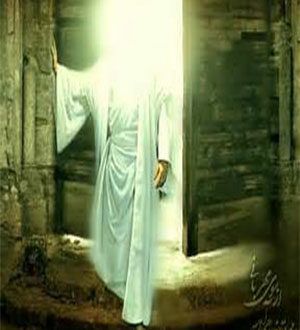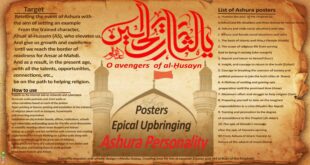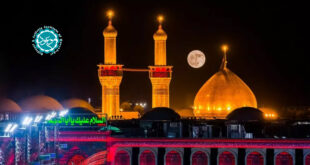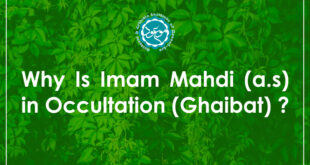It is related that Imams al-Hasan and al-Hussein once noticed an old man performing the ritual ablution incorrectly. They avoided stating to him directly; hence, they agreed on making him the arbiter who should rule of the most accurate ablution. As they performed the ablution before him, the old man said, “Sirs! You both have performed the very accurate ablution, but it seems that the old man can master nothing. He now declares his repentance out of your blessing and mercy to the members of your grandfather’s community18”
It is also related that, once, a servant of Imam al- Hussein (a) committed a mistake that caused him to be punished. The Imam therefore gave the orders of beating him.
“Sir,” said the servant, “(Remember God’s saying) those who refrain the anger.”
The Imam, hence, ordered to release him.
“Sir,” said the servant, “(Remember God’s saying) and those who forgive people.”
The Imam, hence, forgave him.
“Sir,” said the servant, “(Remember God’s saying) and Allah loves those who do good.”
The Imam said, “Go, you are free for the sake of
Allah. I will also double your payment19”
As-Sawli narrated the following:
A disagreement occurred between al-Hussein and Muhammad Ibn al-Hanafiyya who wrote to his brother: “So then, brother! Your and my father is the same. You are not preferred to me and I am not preferred to you in this point. Regarding your mother Fatima the daughter of the Messenger of God, if my mother possesses gold that is filling the earth, she will never reach the standing of your mother. If you read this missive, you may visit me so that I will please you. You are surely worthier of virtue than I am. Peace and God’s grace and blessings be upon you.”
Al-Hussein did, and they were no longer engaged in any disagreement.
Muhammad Ibn Ja’far and others narrated the following:
A kinsman of Ali Ibn al-Hussein (a) stood in front of him and insulted. The Imam, however, did not reply. When the man went away, the Imam said to his companions: “You have heard what that man had said. I want you to come with me so that you may hear my reply.”
“We will,” we replied, “we, however, wanted you to answer him.”
The Imam took his shoes and went reciting (God’s saying): (Those who refrain from anger and those who forgive the people. Allah loves those who do good.)
We understood that he would not say anything to that man.
When the Imam was in front of that man’s house, he shouted (at the servants), “Tell him that it is Ali Ibn al-Hussein.”
The man rushed out towards us with evil intent. He had no doubt that the purpose of the Imam’s attendance had been to repay him for some of his evil deeds.
“Brother,” said Ali Ibn al-Hussein, “you stood proudly over me and over spoke. If you have said what is really in my character, I then seek Allah’s forgiveness. If you have said what is not in my character, Allah may forgive you!”
The man kissed the Imam between the eyes and confessed: “I said what was not in your character. In fact, I am worthier of seeking God’s forgiveness20.”
Ali Ibn al-Hussein (a) narrated: Amirul-Mu’minin (a) went for facing the three individuals who had sworn by Lat and Uzza21 and took upon themselves the pledge of killing the Prophet (S) He could kill one and capture the others. When he carried out the Prophet’s order of advancing one of them before him, the Prophet (S) asked him to declare that there is no god but Allah and that he is His messenger. The man answered: “To move the unshakable Mount Abu Qubays is easier for me than uttering this statement.” Hence, the Prophet (S) asked Amirul- Mu’minin (a) to behead him.
The same thing was said to the other man whose answer was, “Attach me to the previous.” The Prophet (S), also, asked Amirul-Mu’minin (a) to attach him to the previous. In this very time, the Archangel Gabriel descended and said to the Prophet (S): “Muhammad, your Lord sends His salaams to you and asks you not to kill this one, because he was well-mannered and openhanded with his people.” The Prophet (S) shouted at Amirul-Mu’minin: “Ali, stop it. The messenger of my Lord has just told me that this man was well-mannered and openhanded with his people.” As he heard the Prophet’s statement, the man who was under the edge of the sword wondered: “Was it the messenger of your Lord who told you of this?” The Prophet (S) said: “Yes, it was.”
The man said: “By God I swear, I have never possessed a single dirham22 while a brother of mine does not have it. I also have never frowned my face in warfare. I now declare that there is no god but Allah and you are surely the messenger of God.” The Prophet (S) commented: “This is a man whose moral conduct and openhandedness have drawn him to the gardens of bliss.”23
Notes:
1. Quoted from al-Kafi.
2. Quoted from al-Kafi.
3. Quoted from Men La Yahdhuruh ul-Faqih.
4. Believer stands for every individual who believes in the fundamental beliefs of Islam. It differs from Muslim in the point that a Muslim is everyone who utters the shahada (The Muslim profession of faith: La ilaha illa (A)llah, Muhammadun rasul Allah, ‘there is no god but Allah, [and] Muhammad is the messenger of God’) verbally, even if he does not believe in it, while the believer is the individual who utters the shahada and believe in it in heart.
5. Quoted from al-Kafi.
6. Quoted from al-Kafi.
7. Mujahid is the performer of jihad.
8. Quoted from al-Kafi.
9. Quoted from al-Kafi.
10. Quoted from Tuhaf ul-Uqoul.
11. Quoted from Safinat ul-Bihar.
12. Koreish is the tribe that inhabited Mecca in the time of the Prophet Muhammad (S) and to which he belonged.
13. Quoted from Safinat ul-Bihar.
14. Amir ul-Mu’minin (the commander of the faithful) is a name that the Prophet (S) gave exclusively to Ali ibn Abi Talib (a). However, all the leaders that ruled the Islamic states had it to themselves.
15. Dinar is the golden currency of the Arabs and the Islamic states.
16. Quoted from Bihar ul-Anwar; vol. 6
17. Quoted from Safinat ul-Bihar
18. Quoted from Bihar ul-Anwar; vol. 10, quoted from Uyoun ul- Mahasin; p. 89
19. Quoted from Bihar ul-Anwar; vol. 10, quoted from Keshf ul- Ghumma.
20. Quoted from Bihar ul-Anwar; 11/17, quoted from I’lam ul- Wara and al-Irshad.
21. Lat and Uzza are the two major idols the Arabs were regarding as gods before Islam.
22. Dirham is the currency of the Arabs as well as the Islamic states
23. Quoted from Bihar ul-Anwar; vol. 15 part 2 p. 210.

The Holy Ahlul-Bayt (A.S.); Ethical Role-Models
Pages: 1 2
 Mouood Mouood English Edition
Mouood Mouood English Edition



